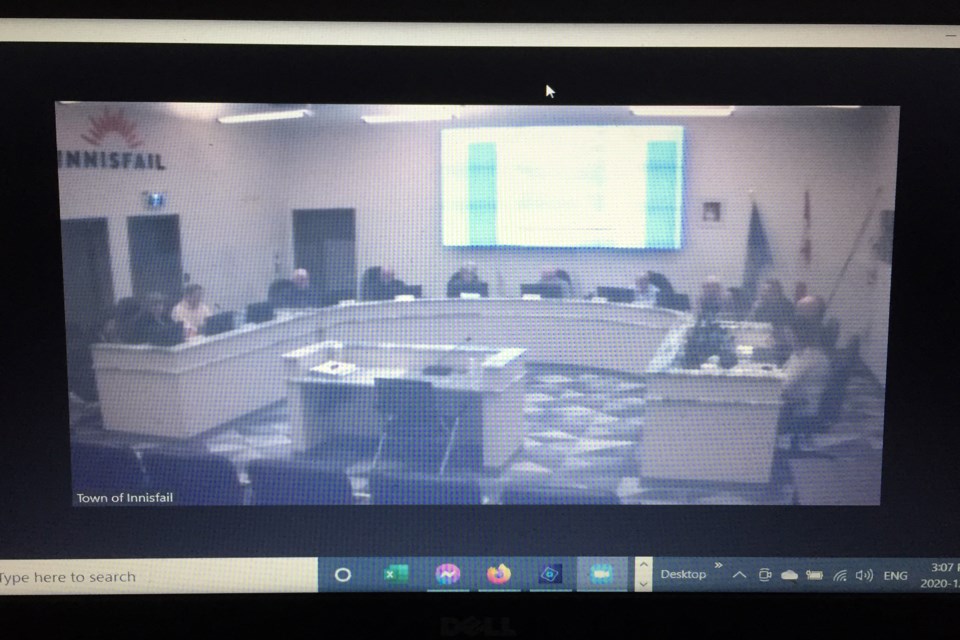INNISFAIL – Town council has officially approved the 2021 operating and capital budgets that will result in a zero per cent tax increase for local property owners.
Council unanimously passed the operating budget of nearly $21.7 million, capital budget of about $4.7 million, along with a contingency of $61,730, at its Dec. 14 regular council meeting.
The mill rate, the amount of tax payable per dollar of the assessed value of a property, will be set in March when the municipality receives final assessments, along with its provincial education tax requisition.
“When the actual assessments come in March, a mill rate may go up but they will see a (tax) decrease no matter what because the assessments are three per cent lower,” said Heather Whymark, the town’s director of corporate services, adding she’s not expecting to see a significant increase with provincial education taxes.
"Doable budget"
Mayor Jim Romane said he believes it’s a “doable” budget going forward, and one he and the rest of council is “quite comfortable” with, considering the current uncertain and tumultuous times brought on by the COVID-19 pandemic.
“It’s a tough time. They (ratepayers) understand the situation and the least we could do for them was to give them a zero per cent increase. With a reduction in their assessment, they will probably be paying a little less tax this year,” said the mayor. “It’s good for them but it’s the small business guys that are getting hit the hardest. I’m just hoping this vaccine they are coming out with is going to flood the market faster than we think it is.”
Romane heaped praise on staff for the hard work of putting together all of the budget numbers and presenting options that led to a zero per cent increase, while still having enough in the communal kitty to provide full core services.
“I cannot say enough about the staff. They really put their minds to it. There was total cooperation from all of the staff. Everybody just realized the situation we are in, and all worked together,” said Romane. “They are just happy to have a good job right now with good benefits.”
Council’s final approval of the 2021 budget came after two and a half days of deliberations from Nov. 23 to 25. Staff and members of council went to work with a focus on efficiency, maintaining core service levels, and finding the right answer against the loss of two per cent of revenues due to the unpredictability of COVID, and residential tax assessments.
Reaching zero
To reach the goal of a zero-tax increase for ratepayers, they had to begin deliberations with an eye to make up a revenue hole of $120,000, which would have been double if not for a new commercial tax revenue injection of about the same amount from the new solar farm.
“It came at the right time,” said Whymark of the new commercial tax revenue. “Without the solar farm, we would have been about $240,000 tax dollars short starting out this year.”
Whymark said a big factor in finding the needed $120,000 was through the cooperation from staff in finding ways to cut expenses. Whymark asked them to go “minimal” at one per cent, but staff ultimately found savings of between four to seven per cent in each department.
“They did not have to go back to the drawing board, and we did not have to say, ‘lower more’. They brought it in right off the bat. They understood what we were trying to do,” she said.
Whymark said the biggest change to this year’s budget process was in utility user fees. Ratepayers will be hit with a water rate increase from $2.50 to $2.60 per cubic metre. Sewer rates will jump from $3.20 per cubic metre to $3.45. Household solid waste basic rates will increase from $23 to $25 per month per site.
The budget will also see a new storm water flat charge of $3 for residential and $6 for non-residential town utility customers. The town said the intent of this program is to create a dedicated reserve to fund the replacement of aging storm water infrastructure.
As for what the town intends to do in 2021 with its planned $4.7 million capital project budget, it will move forward with the long-awaited CP Rail Pedestrian Crossing project at a cost of $600,000, along with the $75,000 train whistle cessation program. The town will also spend millions, largely funded from provincial and federal grants, on infrastructure projects, including 53 Avenue and 46 Avenue infrastructure repairs, as well as 2021 surface improvements.



